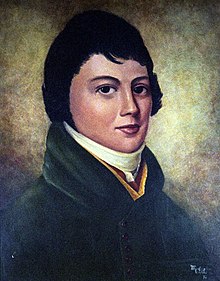George Izard
George Izard
George Izard | |
|---|---|
 | |
| 2nd Governor of Arkansas Territory | |
| In office March 4, 1825 – November 22, 1828 | |
| President | James Monroe John Quincy Adams |
| Preceded by | James Miller |
| Succeeded by | John Pope |
| Personal details | |
| Born | October 21, 1776 Richmond, England |
| Died | November 22, 1828 (aged 52) Little Rock, Arkansas, U.S. |
| Cause of death | Gout |
| Resting place | Mount Holly Cemetery, Little Rock, Arkansas, U.S. 34°44′15.3″N 92°16′42.5″W / 34.737583°N 92.278472°W |
| Nationality | American |
| Political party | Democratic-Republican Party |
| Spouse(s) | Elizabeth Farley |
| Alma mater | University of Pennsylvania |
| Occupation | Military officer, politician |
| Military service | |
| Allegiance | |
| Branch/service | United States Army |
| Years of service | 1794–1803 1812–1815 |
| Rank | Major-General |
| Battles/wars | War of 1812 |
George Izard (October 21, 1776 – November 22, 1828) was a senior officer of the United States Army who served as the second Governor of Arkansas Territory from 1825 to 1828.
Early life[edit]
Izard was born in Richmond, England, to Ralph Izard, who was a delegate to the Continental Congress and United States Senator from South Carolina, and Alice DeLancey, niece of New York Governor James DeLancey and a descendant of Stephanus Van Cortlandt and Gertrude Schuyler. He graduated from the College of Philadelphia (now the University of Pennsylvania) in 1792. He attended military academies in England and Germany and received military engineering instruction in France.
Military career[edit]
Izard returned to the United States in November 1794, and received a commission as Lieutenant in the US Army Corps of Engineers. He was ordered by Secretary of War James McHenry to oversee the construction of Castle Pinckney in South Carolina.[1]
In January 1800, Izard became aide-de-camp to Army commander Alexander Hamilton. A few months later he was invited by William Loughton Smith, Minister Plenipotentiary to Portugal, to serve as his secretary, a position he accepted. He left Portugal the next year and returned to the United States. He officially resigned his army commission in June 1803.
In March 1812, Izard was appointed as Colonel of the newly organised 2nd Artillery Regiment. He was promoted to Brigadier General a year later, and served as Wade Hampton's second in command until his resignation, when Izard succeeded him. Promoted to Major General in January 1814, he was in charge of the Northern Army protecting Lake Champlain, until ordered to reinforce the Army of Niagara. He was discharged in June 1815.[2]
Political career[edit]
Izard was appointed Governor of Arkansas Territory in March 1825, and served until his death in 1828.[3]
Death[edit]
Izard died of complications of gout in Little Rock, Arkansas. Izard was originally buried near the Peabody School in Little Rock. After the historic Mount Holly Cemetery was established, Izard's remains were moved to the Mount Holly Cemetery in Little Rock in 1843.[4]
Legacy[edit]
Izard County, Arkansas is named in his honor.[5][6] General Izard's original artillery unit still exists as the 1st Battalion of the 3rd Air Defense Artillery Regiment.
See also[edit]
References[edit]
- ^ "Governor George Izard Day". State of Arkansas. Retrieved August 9, 2012.
- ^ Historical Register and Dictionary of the US Army
- ^ "Governor George Izard Day". State of Arkansas. Retrieved August 10, 2012.
- ^ "George Izard (1776–1828)". The Central Arkansas Library System. Retrieved August 9, 2012.
- ^ "Profile for Izard County, Arkansas, AR". ePodunk. Archived from the original on July 20, 2014. Retrieved August 10, 2012.
- ^ Gannett, Henry (1905). The Origin of Certain Place Names in the United States. Govt. Print. Off. pp. 167.
External links[edit]
- Encyclopedia of Arkansas Profile
- George Izard at Find a Grave
- State of Arkansas: Governor George Izard Day
| Political offices | ||
|---|---|---|
| Preceded by James Miller | Governor of Arkansas Territory 1825–1828 | Succeeded by John Pope |


Comments
Post a Comment